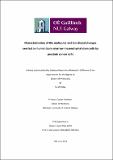| dc.description.abstract | Mesenchymal stem cells (MSCs) are a heterogenous population of multipotent cells
that are capable of differentiating into osteocytes, chondrocytes and adipocytes.
MSCs reside in various areas such as the bone marrow, fat and dental pulp. Recently,
MSCs have been found to home to the tumour site and engraft in the tumour stroma.
However, it is not yet known whether they have a tumour promoting or suppressive
function. We investigated the interaction between prostate cancer cell lines - 22Rv1,
DU145 and PC3 - and bone marrow derived MSCs. MSCs were ‘educated’ for
extended periods in prostate cancer cell conditioned media and analysed for
molecular and functional phenotypic changes. MSCs conditioned with the bone
metastatic cell line, PC3, were found to be the most responsive with a secretory
profile rich in pro-inflammatory cytokines. PC3 educated MSCs secreted increased
MCP-1, osteopontin, IL-8 and FGF-2 and decreased sFlt-1 in comparison to untreated
MSCs, which was sustained following prolonged growth in complete medium post
conditioning. PC3 educated MSCs are larger in size and have a reduced migration and
invasion capacity that is dependent on exposure to PC3 conditioned medium.
Vimentin and αSMA expression is decreased in PC3 educated MSCs in comparison to
untreated MSCs, however they do retain the capacity to differentiate to osteocytes
and adipocytes. Interestingly, the migration of PC3 cells was increased towards PC3
educated MSCs in comparison to untreated MSCs and of the three cells lines
examined (22Rv1, DU145 and PC3), the effect was specific only to PC3 cells. Taken
together, MSCs develop an altered phenotype in response to PC3 conditioned
medium which results in increased secretion of pro-inflammatory cytokines,
modified functional activity and the chemoattraction of PC3 cells. | en_IE |


